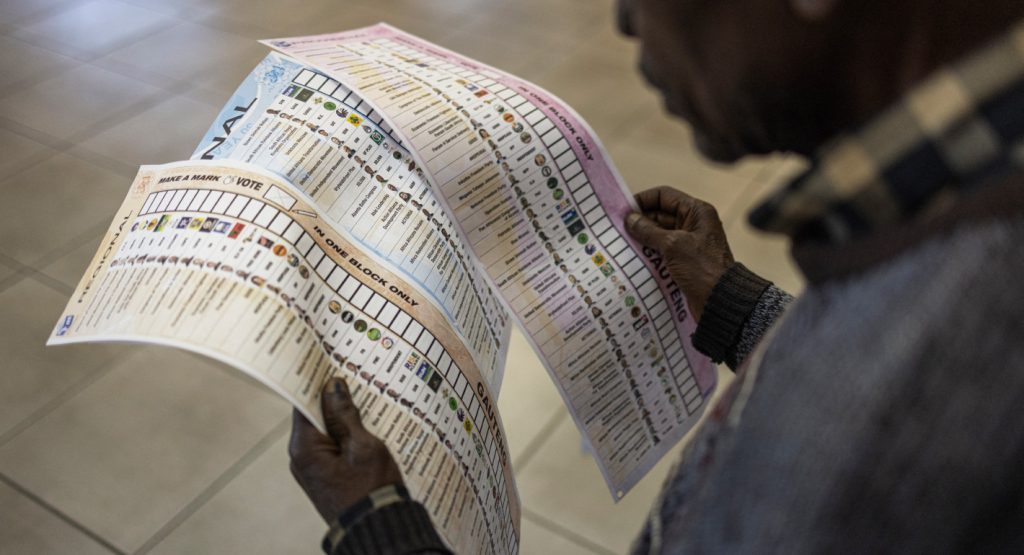The 2024 South African elections may turn out as the most significant since the country’s transition to democracy in 1994. For the first time, the ruling African National Congress (ANC) is predicted to secure less than half the vote, a scenario driven by declining voter turnout.
SBM Intelligence predicts that this development may force the ANC into a coalition government, potentially the most substantial political shift since the end of apartheid.
The election’s implications are profound, touching on historical, political, economic, and social dimensions and influencing both national and regional futures.
Historical Context and Political Dynamics
South Africa’s journey from apartheid to democracy, marked by the ANC’s leadership under Nelson Mandela, is integral to its national identity. However, the ANC now faces significant scrutiny due to its governance challenges, including corruption, economic inequality, and frequent power cuts. The 2024 election, with 28 million registered voters, will determine the composition of the national and provincial parliaments and the next president.
Major Contenders
Cyril Ramaphosa and the ANC:
The incumbent president, Cyril Ramaphosa, faces immense pressure in the South African elections due to high unemployment and an ongoing electricity crisis. Despite the ANC’s promise to create 2.5 million jobs and transition to cleaner energy, its reputation is marred by past corruption scandals and governance issues.
John Steenhuisen and the Democratic Alliance (DA):
The DA, under John Steenhuisen, aims to liberalize the economy, create two million jobs, and address the power crisis. The DA’s role in forming the Multi-Party Charter for South Africa coalition signifies its readiness to unseat the ANC, though its leader’s white minority status poses challenges in a racially diverse electorate.
Julius Malema and the Economic Freedom Fighters (EFF):
The EFF, led by Julius Malema, advocates for radical economic reforms, including land redistribution and nationalization of key sectors. Malema’s popularity among the unemployed youth contrasts with his controversial far-left stance, making him a polarizing figure in South African politics.
Jacob Zuma and the uMkhonto we Sizwe (MK) Party:
Former president Jacob Zuma, despite being barred from running for parliament, continues to influence the election through the MK party. His support base, particularly in KwaZulu-Natal, could fragment the ANC’s votes, adding complexity to the electoral landscape.
Key Issues and Campaign Themes
Economic Challenges:
The ANC’s declining support is largely attributed to economic mismanagement, with high unemployment and economic inequality being critical issues. The unemployment rate, particularly among youth, has reached alarming levels, exacerbating poverty and social unrest. Addressing these issues is crucial for economic stability and growth.
Energy Crisis:
The mismanagement of the power sector has led to frequent blackouts, severely impacting the economy and public morale. The transition to renewable energy, while necessary, poses challenges, particularly in balancing job losses in the coal sector with the growth of new industries.
Social Services:
The healthcare and education sectors reflect the country’s deep-seated inequalities. The newly signed National Health Insurance Act aims to provide universal healthcare but faces criticism over its funding model and feasibility. Education reforms are necessary to address the dysfunction in public schools and improve outcomes for disadvantaged communities.
Corruption and Governance:
Corruption remains a pervasive issue, undermining public trust and economic development. High-profile scandals during previous administrations have highlighted the need for robust anti-corruption measures and transparent governance.
Security and Crime:
High crime rates and inadequate policing have led to a reliance on private security, highlighting the state’s failure to ensure public safety. The government must address the root causes of crime, including poverty and inequality, to create a safer society.
Xenophobia and Migration:
Xenophobic violence has been a recurring issue, with immigrants often scapegoated for economic challenges. The next administration must navigate these tensions carefully to maintain social cohesion and protect human rights.
Regional and International Implications
The outcome of the South African elections will have significant regional and global repercussions. As a leader in the Southern African Development Community (SADC) and a member of BRICS, South Africa’s political stability and policy directions will influence regional politics and international relations, particularly with major powers like the US, China, Russia, and the European Union.
Conclusion
The 2024 election is a watershed moment for South Africa, marking the potential end of the ANC’s dominance and the beginning of a new political era. The outcome will not only shape the country’s future direction but also impact its role on the regional and global stage. Addressing the underlying economic, social, and governance challenges is essential for any incoming administration to ensure a stable and prosperous future for South Africa.

